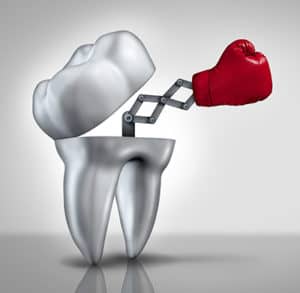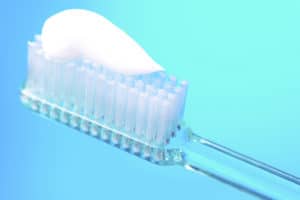Maybe you’ve heard some controversy surrounding fluoride and whether or not it’s actually good for your teeth. Our goal of writing this post is to clear up any speculation surrounding fluoride and whether or not it benefits your dental health.
What is Fluoride?
Fluoride comes from a mineral called fluorite, which is naturally found throughout the Earth. Fluoride is commonly found in a variety of dental hygiene products, specifically toothpaste, thanks to its proven dental health benefits. It is also found in drinking water throughout the United States through a process known as water fluoridation, which the Centers for Disease Control and Prevention has called one of the top 10 greatest health achievements of the 20th century. Fluoride can be found in levels of 0.7 mg per liter of water, a level that has been deemed safe and effective by the U.S. Public Health Service. Additionally, many children up until their teenage years may receive fluoride treatments at their regular dental exams to help support their dental health during their formative years.
Fluoride Benefits
The benefits of fluoride are many. For one, fluoride essentially changes the composition of the tooth to make it stronger and more resistant to tooth decay. Fluoride has also been shown to inhibit plaque and prevent it from producing acid — the key culprit of tooth decay and cavities.
Perhaps the most fascinating benefit of fluoride is its ability to not just prevent tooth decay, but also reverse it. Through a process called remineralization, the tooth rebuilds enamel that has been lost as a result of plaque build-up (a process known as demineralization). While this is a naturally occurring process, fluoride enhances the effects of remineralization to outpace the detrimental effects of plaque and effectively reverse tooth decay.
Despite being a preventable disease, tooth decay is the No. 1 chronic disease for both children and adults in America. Because of its ability to strengthen teeth and fight and reverse tooth decay, fluoride is recommended for most people to effectively promote dental hygiene.
Is Fluoride Bad for You?
Or, is fluoride good for you? There is much speculation surrounding fluoride and whether or not it is harmful for humans to consume. We’d be naive to ignore this speculation and not acknowledge any possible fluoride health risks.
One of the most common side effects of excessive fluoride consumption is dental fluorosis. This side effect is merely cosmetic and may appear as spots on the teeth as a result of excessive fluoride consumption during childhood when the teeth are still under the gums and developing — once the teeth have appeared in the mouth, it is impossible to develop fluorosis. Dental fluorosis may manifest itself as mild white spots on the child’s teeth to darker stains, depending on how much fluoride was ingested.
In order to contract dental fluorosis, fluoride consumption must reach excessive levels, which can typically be achieved through:
- Swallowing toothpaste — children do not spit out toothpaste and swallow it instead
- Consuming fluoridated water that contains more than 2 mg/L of fluoride
- Over consumption of fluoride-enriched soft drinks and fruit juices
To prevent dental fluorosis from occurring in children, parents should take the following precautions:
- Supervise children under age 6 while brushing to prevent swallowing of toothpaste
- Know how much fluoride is in your drinking water (consult with your water provider or find out online)
- Do not give children under age 2 fluoride toothpaste
Fortunately, dental fluorosis is a very treatable cosmetic condition that can be addressed by a quality cosmetic dentist.
Fluoride vs. Non-Fluoride Toothpaste
Some people may be leery of the effects of fluoride and purchase (or make their own) non-fluoride toothpaste. However, for the majority of people, the benefits of fluoridated toothpaste outweigh the low risks of overconsumption and can provide immense improvements in dental health. Again, tooth decay is the most common disease in America, and we should take any steps we can to prevent it.
That being said, there are certain situations in which a non-fluoride toothpaste might be the better option. Children under the age of 2 in particular should not use fluoridated toothpaste as over consumption of fluoride at a young age can result in dental fluorosis.
Other people who may be candidates for non-fluoride toothpaste include:
- Individuals who already consume enough fluoride-rich water and food
- Individuals with fluoride allergies
- Individuals with certain medical conditions
Be sure to consult with your dentist to see if fluoride-free toothpaste is right for you.
Is Fluoride Good for Your Teeth? The Takeaway
Fluoride has been proven to be effective in preventing and reversing the effects of tooth decay, which continues to be a prevalent problem in America. By incorporating the proper amount of fluoride into your daily routine, you can do your part to ensure you stay as healthy as possible.
If you live in the Boulder, Colorado, area and are concerned about tooth decay or cavities, be sure to contact us to schedule an appointment. We’d be happy to help you achieve a brighter and healthier smile.


